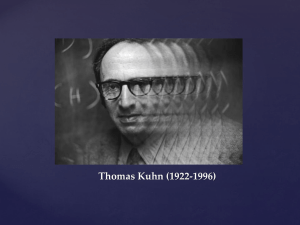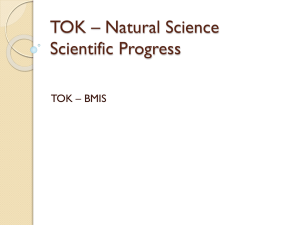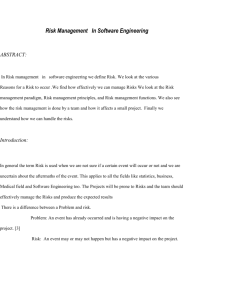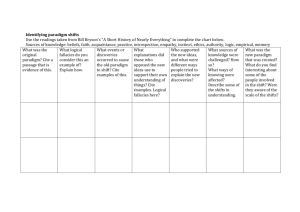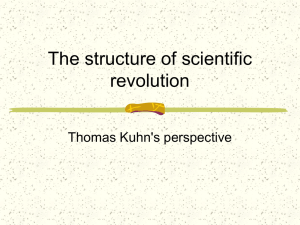Phil of Science - Thomas Kuhn – Scientific Revolution – Chapter 7
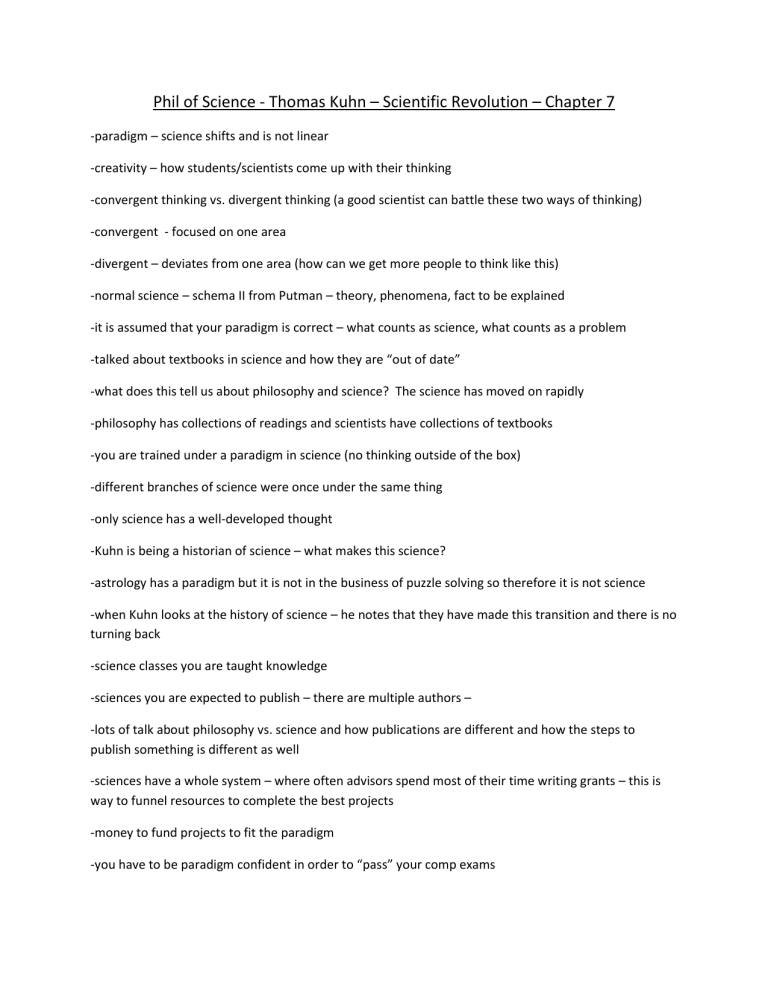
Phil of Science - Thomas Kuhn – Scientific Revolution – Chapter 7
-paradigm – science shifts and is not linear
-creativity – how students/scientists come up with their thinking
-convergent thinking vs. divergent thinking (a good scientist can battle these two ways of thinking)
-convergent - focused on one area
-divergent – deviates from one area (how can we get more people to think like this)
-normal science – schema II from Putman – theory, phenomena, fact to be explained
-it is assumed that your paradigm is correct – what counts as science, what counts as a problem
-talked about textbooks in science and how they are “out of date”
-what does this tell us about philosophy and science? The science has moved on rapidly
-philosophy has collections of readings and scientists have collections of textbooks
-you are trained under a paradigm in science (no thinking outside of the box)
-different branches of science were once under the same thing
-only science has a well-developed thought
-Kuhn is being a historian of science – what makes this science?
-astrology has a paradigm but it is not in the business of puzzle solving so therefore it is not science
-when Kuhn looks at the history of science – he notes that they have made this transition and there is no turning back
-science classes you are taught knowledge
-sciences you are expected to publish – there are multiple authors –
-lots of talk about philosophy vs. science and how publications are different and how the steps to publish something is different as well
-sciences have a whole system – where often advisors spend most of their time writing grants – this is way to funnel resources to complete the best projects
-money to fund projects to fit the paradigm
-you have to be paradigm confident in order to “pass” your comp exams
-tests in philosophy deal with logic
-back to Kuhn..
-you get to pick something that is unbiased
-talks about scientific research
-typical research is very repetitious – you do multiple projects where you change one little thing to fit the paradigm (getting theory and paradigm as close as it can be)
-researchers are the puzzle solvers of schema II
-this is where the convergent approach comes into play
-central tension – you can build up evidence
-scientists are judged – the paradigm is not judged
-now to the history of paradigm change..
-paradigm argument is typically circular
-use the paradigm to defend the paradigm
-in order for this to work you both have to buy into the paradigm shift
-auxiliary hypothesizes are different and so are the theories – also what they consider is valid science – questions that they consider important – if they have any agendas
-every paradigm has it’s anomalies – but you want to figure out why these anomalies are – so a really good paradigm will take a history of anomalies and make it fit the theory
-when you have a debate against paradigms – you go in a circular
-every paradigm that has an anomalies according to Kuhn
-paradigm changes – each person argues their paradigm and each person thinks they are right – Kuhn will content that after a while one paradigm will overtake the other and that will be accepted
-rejecting a paradigm, you lose certain tools – and you might gain some
-Kuhn is saying that in science there is the institution of creating good paradigm scientists - so there will only be one paradigm taught
-you use the ability you have to explain phenomena – other phenomena will be anomalies
-Kuhn made the assumptions that paradigms do not always progress when they make assumptions
-most radical part of Kuhn science – how does this paradigm go?
-we reject some nice, hopeful way to explain something – so now what?
-each paradigm will have its strength and weaknesses – so by the vales each will hold it’s own
-how do you chose your paradigm?
-basic vs. applied science
-if we have an inter-paradigm debate, it would be rare..
-do you think paradigm changes in history has been reasonably and smart? How does the scientist pull it off? How can you have smart and reasonable shifts in the history of science?
-we need a formal way to set out how paradigms shift – if paradigm shift is reasonable, what makes this so?
-we use different paradigms to solve problems – we can use more than one paradigm to solve a problem
– if a paradigm has been rejected – it lost, but scientist still use this theory – we have rejected a theory, but we know the uses of it within certain restrictions
-a good new paradigm can take over the old one and explain so much more
-if this picture was whole and complete, then the success of science would be incomplete
-you are not a scientist if you are not doing scientific research in physics
-general science can explain why you can get away with certain things/ideas
-Kuhn cannot explain how science has progressed..
-paradigm shifts are weird.. that is the Kuhn that people know – Kuhn has had a profound effect on science and paradigm change and about their not being a paradigm standard. The decisions are circle and we try to figure out why they are rational.. some think science is silly
In conclusion bees fly
